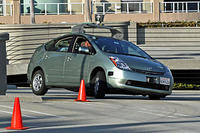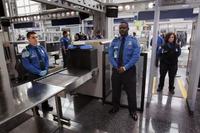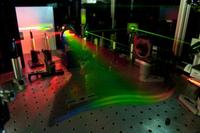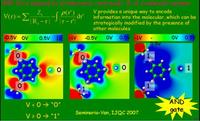-
First no-fly list case goes to trial
Rahinah Ibrahim, dean of the architecture and engineering school at the University of Malaysia, took to trial on Monday her claim against the U.S. government for wrongfully listing her on the government’s no-fly list. Ibrahim has sought to clear her name since January 2005, when she was arrested at San Francisco International Airport. Similar lawsuits are pending across the country, but Ibrahim’s case is the first to go to trial. Ibrahim claims she was mistakenly placed on the no-fly list due to her national origin and Muslim faith.
-
-
Existing airports through futuristic glass pods
Two small Northeast airports, Syracuse and Atlantic City, have installed futuristic unmanned portals to replace security officers at the airports’ exit points. The move, which will add a few seconds to the end of passengers’ trips as they exit the airports, is estimated to save airports millions of dollars in wages over time.
-
-
Bottle scanning tech to enhance airport security, benefit passengers
Los Alamos scientists have advanced a Magnetic Resonance Imaging (MRI) technology that may provide a breakthrough for screening liquids at airport security. They have added low-power X-ray data to the mix, and as a result have unlocked a new detection technology. Funded in part by the DHS’s Science and Technology Directorate (S&T), the new system is named MagRay.
-
-
GAO says TSA’s costly behavioral detection program falls short
The Government Accountability Office(GAO) said last week that DHS may have wasted $1 billion on the Transportation Security Administration’s (TSA) Screening of Passengers by Observation Techniques (SPOT) program. SPOT aims to spot terrorists by detecting “anomalous” or suspicious behavior. The anomalous behavior – perspiration, fidgeting, restlessness – is supposed to be the result of high levels of stress, fear, or deception. Individuals who exhibit anomalous behavior are subject to additional security screening.
-
-
Drive-by charging: Advancing wireless power transfer for vehicles
Researchers have developed new technology and techniques for transmitting power wirelessly from a stationary source to a mobile receiver — moving engineers closer to their goal of creating highway “stations” that can recharge electric vehicles wirelessly as the vehicles drive by.
-
-
Ann Arbor to offer residents networked, driverless cars by 2021

By 2021, Ann Arbor could become the first American city with a shared fleet of networked, driverless vehicles. This is the goal of the Mobility Transformation Center, a cross-campus University of Michigan initiative that also involves government and industry representatives.
-
-
Unexpected pleasures: a new airport security-check experience
If airport security checks cannot be made to move at a quicker pace, how about making them more comfortable, even pleasant? This is what a pilot project at the Dallas/Fort Worth (DFW) International Airport’s Terminal E is trying to do. SpringHill Suites by Marriott has brought its hotel experience to E18 security check point, where passengers will now be welcomed by a stylish decor, soothing wall art, vibrant lighting, and relaxing ambient music in a setting that spans the entire checkpoint area. Lounge seating at the entrance and a furnished area for customers to gather their belongings after the screening process.
-
-
TSA tells airports to guard exit lanes
The Transportation Security Administration (TSA) has notified the nation’s airports that it will stop guarding the exit doors between arriving flights and baggage claim. TSA informed airports that they should start assuming the new responsibility at the beginning of 2014, with complete takeover by end of March 2014. Transferring the responsibility for guarding exit doors to the airports will save the TSA $88.1 million a year.
-
-
Man arrested in connection with LAX dry ice bombs
Four dry ice bombs were planted in restricted area of LAX Sunday and Monday. Two bombs exploded, causing no injury or damage, and two were found before they exploded. The LAPD announced it had arrested 28-year-old Dicarlo Bennett, an LAX employee of one of the airport’s ground crew contractors, Servisair. The LAPD chief says the police and FBI believe there was “no nexus” between the bombs and terrorism, but that the incident is related to a labor dispute.
-
-
Guardrails made safer with impact-absorbing Mediterranean tapeweed coating
Researchers have developed protective guardrails from residue of Posidonia oceanica,commonly known as Neptune Grass or Mediterranean tapeweed, in order to minimize the risk of injuries on the roads. The waste material is useful for coating the support posts of guard rails on roads so they can absorb and dissipate much of the kinetic energy if a collision occurs, preventing lacerations and amputations in cases in which a human body hits the support post.
-
-
Threats to transportation, other key infrastructure
Effective and efficient transportation plays a crucial role not only in the everyday lives of citizens, but also in ensuring the on-going economic well-being of communities and countries. People are able to get to work on time, goods are transported in a cost-effective manner, and energy is used as efficiently as possible. This is why disruption to transport, whether intentional or not, can cause such damage. As public transport is by its nature open and accessible to everyone, it is susceptible to terrorist attack, as seen all too clearly in the 2005 London bombings and the coordinated attack on four commuter trains in Madrid in 2004.
-
-
DHS finds no racial profiling at Logan Airport

An August 2012 allegation of racial profiling by Transportation Security Administration (TSA) officers sparked an investigation into the screening practices of TSA officers at Logan International Airport. DHS has recently concluded an investigation into allegations, and concluded that there was no evidence that TSA officers in Boston have been targeting minorities for additional screening to meet quotas.
-
-
Bomb-detecting lasers to improve security checkpoints

Research has put the possibility of bomb-detecting lasers at security checkpoints within reach by developing a laser that can detect micro traces of explosive chemicals on clothing and luggage. The laser not only detects the explosive material, but it also provides an image of the chemical’s exact location, even if it’s merely a minute trace on a zipper.
-
-
Boob bombs: breast implants suicide bomb a threat to aviation
Security checks at Heathrow Airport have been beefed up this past week following “credible” intelligence that al Qaeda operatives may use a new method to attack airlines flying out of London: explosives concealed in breast implants. This would not the first time Al Qaeda in the Arabian Peninsula’s (AQAP) chief bomb maker, Ibrahim al-Asiri, has sought to use the human body as a hiding place for explosives. In September 2009, al-Asiri sent his younger brother on a suicide mission in Saudi Arabia. He built a bomb which could fit in his brother’s anal cavity, and sent him to kill the Saudi deputy interior minister, who at the time was in charge of hunting down al Qaeda operatives in Saudi Arabia. The worry about medically implanted explosives has already led airports to use behavioral analysis to augment detection methods already in use to screen people. Body scanners are good at identifying things outside the body but not inside.
-
-
Molecule “scanner” uses terahertz radiation to identify single molecules

Molecules could soon be “scanned” in a fashion similar to imaging screenings at airports, thanks to the world’s smallest terahertz detector, developed by University of Pittsburgh physicists. The scanner has the ability chemically to identify single molecules using terahertz radiation — a range of light far below what the eye can detect.
-
More headlines
The long view
New Technology is Keeping the Skies Safe
DHS S&T Baggage, Cargo, and People Screening (BCP) Program develops state-of-the-art screening solutions to help secure airspace, communities, and borders
